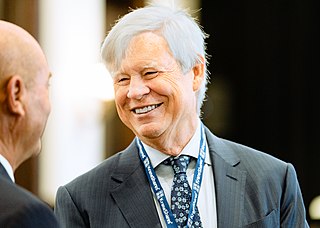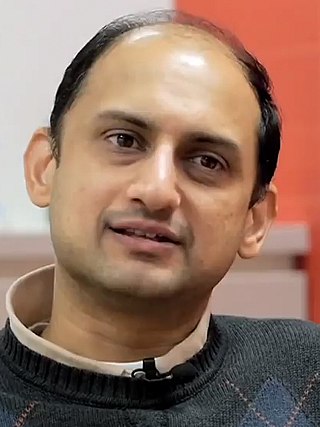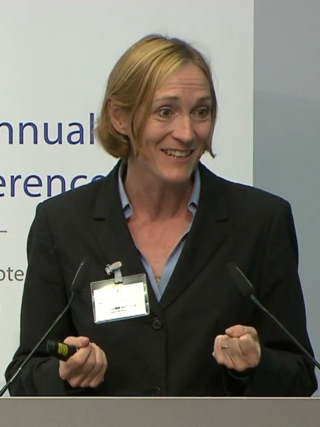Related Research Articles

Andrew Michael Spence is a Canadian-American economist and Nobel laureate.

Robert Fry Engle III is an American economist and statistician. He won the 2003 Nobel Memorial Prize in Economic Sciences, sharing the award with Clive Granger, "for methods of analyzing economic time series with time-varying volatility (ARCH)".
Matthew Richardson is the Charles E. Simon Professor of Applied Economics and Professor of Finance in the Finance Department at the Leonard N. Stern School of Business of New York University (NYU). He is also the Director of Alternative Investments at the Salomon Center for the Study of Financial Institutions at NYU. and a Research Associate of the National Bureau of Economic Research. Richardson is a co-editor of the Annual Review of Financial Economics.
Kenneth Ronald "Ken" French is the Roth Family Distinguished Professor of Finance at the Tuck School of Business, Dartmouth College. He has previously been a faculty member at MIT, the Yale School of Management, and the University of Chicago Booth School of Business. He is most famous for his work on asset pricing with Eugene Fama. They wrote a series of papers that cast doubt on the validity of the Capital Asset Pricing Model (CAPM), which posits that a stock's beta alone should explain its average return. These papers describe two factors above and beyond a stock's market beta which can explain differences in stock returns: market capitalization and "value". They also offer evidence that a variety of patterns in average returns, often labeled as "anomalies" in past work, can be explained with their Fama–French three-factor model.
David Yermack is an American academic who serves as a professor of finance at the New York University Stern School of Business, and adjunct professor of law at New York University School of Law. Professor Yermack also teaches for the Master of Science in Global Finance (MSGF), a joint program between Stern and the Hong Kong University of Science and Technology.

Richard David Portes CBE is a professor of Economics and an Academic Directior of the AQR Asset Management Institute at London Business School. He was President of the Centre for Economic Policy Research, which he founded. He also serves as Directeur d'Etudes at the Ecole des Hautes Etudes en Sciences Sociales in Paris.
Kenneth C. Froewiss was a Clinical Professor of Finance at the New York University Stern School of Business, and specialized investment banking, mergers and acquisitions, and corporate governance. Professor Froewiss also taught for the TRIUM Global Executive MBA Program, an alliance of NYU Stern, the London School of Economics and HEC School of Management, and served as Academic Director of Executive Programs at NYU Stern.
TRIUM Global Executive MBA program is an alliance between NYU Stern School of Business, London School of Economics and Political Science (LSE), and HEC School of Management, Paris. TRIUM is ranked at #2 in the world in the 2018 Financial Times EMBA rankings and #1 in the 2014 edition.
Thomas Ferguson Cooley was the Paganelli-Bull Professor of Economics at the New York University Stern School of Business. He served as Dean of the Stern School from 2002 to January 2010. He was also a Professor of Economics in the NYU Faculty of Arts and Science. Cooley was a widely published scholar in the areas of macroeconomic theory, monetary theory and policy, and the financial behavior of firms.
Anthony Saunders is the John M. Schiff Professor of Finance at New York University Stern School of Business and is currently on the Executive Committee of the Salomon Center of the Study of Financial Institutions. He teaches "Market and Liquidity Risk" in the Risk Management Open Enrollment program for Stern Executive EducationArchived 2010-08-10 at the Wayback Machine. Saunders also teaches for both the Master of Science in Global Finance (MSGF) and Master of Science in Risk Management Program for Executives (MSRM). MSGF is jointly offered by NYU Stern and the Hong Kong University of Science and Technology. MSRM is offered by NYU Stern, in partnership with the Amsterdam Institute of Finance.
Menachem Brenner is a professor of finance and a Bank and Financial Analysts Faculty Fellow at New York University Stern School of Business. He teaches a course in options and futures, along with an introduction to finance course. Brenner also teaches for the Master of Science in Global Finance (MSGF), which is a joint program between Stern and the Hong Kong University of Science and Technology.
Alexander Ljungqvist is a Swedish economist, educator, scholar, writer, and speaker. He is a professor of finance at the Stockholm School of Economics, where he is the inaugural holder of the Stefan Persson Family Chair in Entrepreneurial Finance. His areas of expertise include corporate finance, investment banking, initial public offerings, entrepreneurial finance, private equity, venture capital, corporate governance, and asset pricing. Professor Ljungqvist teaches MBA and executive courses in private equity and venture capital and a PhD course in corporate finance.
Robert Eric Wright is a business, economic, financial, and monetary historian and the inaugural Rudy and Marilyn Nef Family Chair of Political Economy at Augustana University in Sioux Falls, South Dakota. He is also a research economist at the National Bureau of Economic Research.

Peter Blair Henry, an economist, was the ninth Dean of New York University's Leonard N. Stern School of Business, and William R. Berkley Professor of Economics and Business, and author of TURNAROUND: Third World Lessons for First World Growth. Previously, he was the Konosuke Matsushita Professor of International Economics at Stanford University.
Nicholas Economides is an internationally recognized academic authority on network economics, electronic commerce and public policy. His fields of specialization and research include the economics of networks, especially of telecommunications, computers, and information, the economics of technical compatibility and standardization, industrial organization, the structure and organization of financial markets and payment systems, antitrust, application of public policy to network industries, strategic analysis of markets and law and economics.
Thomas Philippon is a French economist and professor of finance at the New York University Stern School of Business.

Lawrence J. White is Robert Kavesh Professor of Economics at New York University's Leonard N. Stern School of Business. During 1986–1989 he was on leave to serve as board member, Federal Home Loan Bank Board, in which capacity he also served as board member for Freddie Mac; and during 1982–1983 he was on leave to serve as Director of the Economic Policy Office, Antitrust Division, US Department of Justice. He is the General Editor of The Review of Industrial Organization and formerly Secretary-Treasurer of the Western Economic Association International.
William L. Silber is a former chaired professor at The Stern School of Business, New York University, most recently as the Marcus Nadler Professor of Finance and Economics (2002-2019) and before that as the Abraham Gitlow Professor of Economics and Finance (1990-2002). He has served as Senior Economist with the President's Council of Economic Advisors, was a member of the Economic Advisory Panel of the Federal Reserve Bank of New York, and has published eight books, including a college textbook, Principles of Money, Banking and Financial Markets, with Lawrence Ritter and Gregory Udell, that has gone through twelve editions. His most notable contributions have been in monetary economics, finance, and economic history, where he has shown the importance of analyzing institutional detail before applying statistical techniques to historical data.

Viral V. Acharya is an Indian economist who was appointed as Deputy Governor of Reserve Bank of India (RBI). He also served as a member of the advisory council of the RBI Academy and was a member of the Academic Council of the National Institute of Securities Markets (NISM), Securities and Exchange Board of India (SEBI) since 2014. As of 23 January 2017, he was appointed to serve a three-year term as a Deputy Governor of the Reserve Bank of India. He resigned from the post in July 2019 with 6 months left for his completion of term.

Laura Veldkamp is an American economist teaching as a professor of finance at Columbia University's Graduate School of Business and also serves as a co-editor of the Journal of Economic Theory.